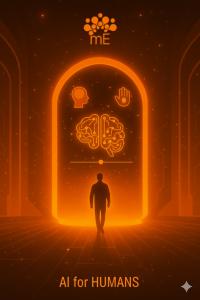AI Needs Users Before Users Need AI
Bigger models don't guarantee adoption. Trusted, daily utility—delivered on-device with clear consent—does.
When intelligence runs on the user’s device—private, fast, and clear about consent—people keep it. Only then does participation make sense.”
BOSTON, MA, UNITED STATES, October 28, 2025 /EINPresswire.com/ -- The AI industry often confuses capability with adoption. A dazzling demo can dominate a news cycle, but only habits determine whether people keep using a product. That distinction shapes mEinstein’s thesis: AI must earn the right to exist in a user’s life. The company’s approach—edge-native computation, consent rails, and immediate utility—translates that principle into practice. — Mark Johnson, Chief Operating Officer of mEinstein
The adoption funnel begins with utility. Within minutes of install, an assistant should deliver a concrete, acted-upon win: a resolved calendar conflict, a proactive refill reminder, a bill avoided, a flight found. To achieve that reliably, intelligence must run on-device for sub-second responses and offline resilience. When experiences feel native and dependable, they become part of daily routines.
Next is trust. Trust is not a marketing claim; it is an architecture. In an edge-native design, personal context remains local by default. Consent is human-readable—what is shared, with whom, for what purpose, and for how long—with one-tap revocation and an audit log. Copyright/Data IDs and data DRM make policies enforceable by code, turning privacy from paperwork into product.
Only after utility and trust are established does participation make sense. At that point, users may choose to license specific data or AI-generated insights through a marketplace, or to contribute to model learning via LoRA—a technique that fine-tunes large models by training tiny adapter weights. In mEinstein’s approach, those adapter weights only (never raw data) can be contributed to compatible providers for evaluation and compensation. The result is a privacy-preserving, compute-light complement to centralized training.
The rationale for edge-native is straightforward. Privacy improves because intimate signals do not leave the device unless a person says so. Latency improves because NPUs and distilled models run responses in sub-second time. Economics improve because intelligence scales with the installed base of devices, not with runaway server bills. And rights become programmable when artifacts carry IDs, policies, and prices that systems can enforce.
Positioning vs. cloud chat assistants. Cloud-first assistants—such as ChatGPT or Grok—have proven the value of large-scale reasoning and creation. mEinstein targets a different layer: habit formation. By running intelligence on-device, it turns personal context into quick, reliable micro-wins (calendar conflicts resolved, refills timed, bills avoided) with sub-second responses and no network dependency. The cloud stays the coordination plane; the device becomes the intelligence plane where habits actually form.
mEinstein operationalizes this model by separating the intelligence plane (on-device) from the coordination plane (cloud). On-device persona models learn privately; the cloud handles training, backup, sync, identity, and settlement—without hoarding raw personal data. When users choose to participate, standardized contracts govern purpose limitation, duration, compensation, and revocation. Two marketplace modes—Proactive listing and Reactive mapping—cover broad and targeted scenarios.
The company proposes measuring progress with metrics that reflect adoption and agency: TTU (Time-to-Utility), DAA (Daily Active Advice), NPSP (Net Privacy Score), CSR (Consented Share Rate), and Adapter Yield for edge-trained LoRA submissions. If these move, retention follows. If they do not, model size alone will not fix engagement.
As the market shifts from model-centric hype to outcome-centric impact, mEinstein positions edge-native consumer AI as the architecture that earns daily use—and therefore durable growth. The thesis is simple: AI needs users before users need AI.
“Adoption is a habit, not a headline,” said Mark Johnson, Chief Operating Officer of mEinstein. “When intelligence runs on the user’s device—private, fast, and clear about consent—people keep it. Only then does participation make sense.”
About mEinstein
Founded in 2021, mEinstein develops decentralized AI to empower users with privacy-first intelligence. Based in Boston, the company drives innovation in the Edge AI economy.
Media Contact: krati.vyas@meinstein.ai
Mark Johnson
mEinstein
+1 703-517-3442
email us here
Visit us on social media:
LinkedIn
Instagram
Facebook
X
Legal Disclaimer:
EIN Presswire provides this news content "as is" without warranty of any kind. We do not accept any responsibility or liability for the accuracy, content, images, videos, licenses, completeness, legality, or reliability of the information contained in this article. If you have any complaints or copyright issues related to this article, kindly contact the author above.

